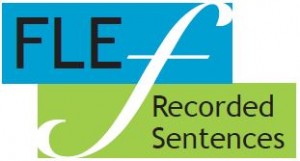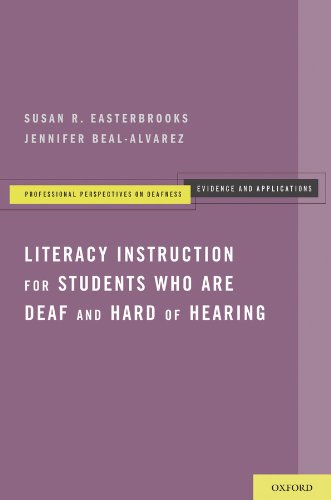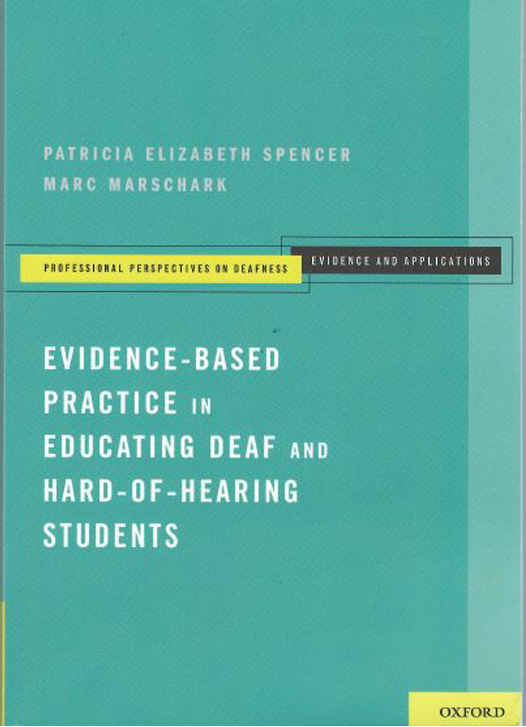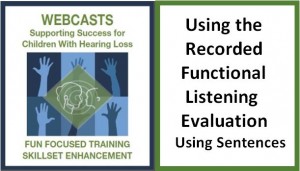Related Products
For Professionals
- Amplification
- Assessment of Student Skills, Challenges, Needs
- Early Childhood: Infants, Toddlers, Preschool
- Hearing Loss – Identification, Impact and Next Steps
- IDEA Law Summary Information
- Language and Speech Development Issues
- Legal Issues in Serving Children with Hearing Loss
- Listening (Auditory Skills) Development
- Planning to Meet Student Needs
- Self-Advocacy Skills for Students with Hearing Loss
- Self-Concept: How the Child with Hearing Loss Sees Himself
- Social Skills
- Speech Perception & Learning
Related Teacher Tools Takeout Items
Relationship of Hearing Loss to Listening and Learning
In the single-sided handouts below, nine different hearing losses are described, accompanied by information on the possible impact of hearing loss. The handouts address the possible impact on speech and language, social interactions, and educational accommodations/service needs specific to each hearing loss. These handouts may be useful in understanding the impact of a hearing loss as well as for advocating for services with school or medical staff. Select the handout that represents the average range of hearing loss for your student or child.
The dB levels of hearing loss are used rather than terms (i.e., minimal, mild, moderate), because these terms in no way match the seriousness of the impact that these hearing losses may have on child development, listening and learning. Any degree of hearing loss is educationally significant.

- 16 — 25 dB Hearing Loss
- 26 — 40 dB Hearing Loss
- 41 — 55 dB Hearing Loss
- 56 — 70 dB Hearing Loss
- 71 — 90+ dB Hearing Loss
- Unilateral Hearing Loss
- Relationship of Hearing Loss to Listening and Learning Needs — 1 hearing loss per page (parent/teacher version)
- Relationship of Hearing Loss to Listening and Learning Needs — 2 hearing losses per page (professional training)
- Relationship of Hearing Loss to Listening and Learning Needs —
Spanish version of Relationship of Hearing Loss to Listening and Learning Needs, all handouts together
French version of Relationship of Hearing Loss to Listening and Learning Needs, all handouts together
Japanese version 決定版 of Relationship of Hearing Loss to Listening and Learning Needs, all handouts together
ARABIC VERSIONS
Arabic 16-25 dB ; Arabic 26-40 dB ; Arabic 41-55 dB ; Arabic 56-70 dB ; Arabic 71-90+ dB ;
Arabic Unilateral ; Arabic Fluctuating ; Arabic High Frequency ; Arabic Mid-Frequency or Reverse Slope
Relationship of Hearing Loss to Listening and Learning Needs – all handouts together
Example Impact Statement for Present Levels of Performance
As part of identifying a student’s present level of performance and for IEP development it is necessary to provide a statement that summarizes the impact of the hearing loss on educational performance. The following is an impact statement for an example student that has been developed by Krista Yukow, educational audiologist, and included here with her generous permission:
It is absolutely critical to understand that hearing aids do NOT fix a hearing loss. Even with his hearing aids Tyler will continue to experience gaps in his hearing and understanding. This was observed this in a quiet, close environment and will occur even more often during: communication containing new vocabulary, fast-paced speech, speech from a distance of greater than 3 feet, when there is any amount of background noise, group discussions and communication that includes figurative language.
It is important to understand that Tyler perceives himself as comprehending all that is said, as he hears more than he misses. He can actually “hear” without his FM/DM device and even without his hearing aids. As a result he perceives himself as “understanding” the entire auditory message. He does not know what he can’t hear, since he can’t hear it.
The complication is that the speech sounds and syntax structures that he doesn’t hear are the THE MOST important ones for speech understanding. It is the minute details of speech that Tyler will not be able to access without his hearing aids and FM/DM system (e.g. the cats drink vs. the cat drinks). Continued use of both pieces of amplification technology are critical in ensuring Tyler’s access to the verbal instruction and to class discussion.
Being the Only Student with a Hearing Loss
The article below was written by a 14-year-old student with a mild-to-moderate hearing loss in one ear and a moderate loss in the other, who uses bilateral hearing aids to access sound. He has always been the only student in his school with a hearing loss, first in pre-school, then elementary school and now junior high school. He is active in sports, has good friends and does well in school. He was the first student with hearing loss in memory to be accepted into the gifted and talented program in his local area while in elementary school. When this was written in 2010 he attended junior high and hoped to be a marine biologist or veterinarian someday. He gets good grades, but has to work hard to do things that his friends who have typical hearing take for granted. The stress and frustration can be overwhelming. With each new school year, he faces the challenges of unfamiliar teachers who probably have never worked with a student who is deaf or hard of hearing before, and classmates who have never had a peer with a hearing loss. Classroom amplification systems have helped, but haven’t always worked. Most of his teachers have been supportive and have gone above and beyond to accommodate his hearing loss. But every year, new problems pop up and he has to learn to cope. And, as been true his whole life, he starts each year as the only kid in school with a hearing loss. – See more at: http://www.listeningandspokenlanguage.org/Document.aspx?id=192#sthash.avoyRMkQ.dpuf
The Lone Sounds of Life
My life as the only student who is hard of hearing in my school can sometimes feel like a bottomless pit of confusion. It is not always that bad, but it is a struggle. I miss a lot of sounds. I often don’t even know if I have missed a sound, sometimes at my own expense. My life at school is defined by what I hear, what I don’t hear and how I learn to cope with the differences.
When I meet new people, they do not always notice my hearing aids. They often do not understand why I do things in a different way, and it may seem weird to them. They will shout at me because they think I am doing something wrong, even though it is just the way I do things. Sometimes, even when they do notice my hearing aids, they will still shout at me. They think I am just being “difficult” or I am lying about my hearing loss. They think I am dumb or don’t have any “feelings” because I can’t hear well.
 In school, I struggle with how some teachers act. They cannot seem to adjust to having a student who is hard of hearing. For example, even though my parents and I have asked them not to, they will do things like speak facing the board and not toward the class. The sound just bounces off the board and away from me. I can only hear a bit of what they say. I can’t understand those lone bits of sound if they don’t talk to me.
In school, I struggle with how some teachers act. They cannot seem to adjust to having a student who is hard of hearing. For example, even though my parents and I have asked them not to, they will do things like speak facing the board and not toward the class. The sound just bounces off the board and away from me. I can only hear a bit of what they say. I can’t understand those lone bits of sound if they don’t talk to me.
Teachers will also sometimes change assignments orally and I will miss what they say. Then, when I turn in the assignment, I get marked down or get an “incompletion” grade, even if I have everything else correct. This makes me feel sad and confused because I try so hard, but I don’t seem to meet their standards. It is not that I cannot do the work, but I need to do it my way. It takes a lot of extra energy to do simple things, like listen to a lecture or take notes on a video that is not closed-captioned. If I cannot see the notes or the information the teachers are trying to pass on to me, I find it harder to understand.
I have learned how to cope with the frustrations of being hard of hearing. I spend time with family and friends who understand me. I am also active in sports, like basketball, soccer and tennis, and that helps, but it is not without problems. Occasionally while playing basketball, I will receive a technical foul because I can not hear the referee, and once a soccer coach threatened to kick me off the team because I couldn’t hear him.
Surprisingly, there are some advantages to being hard of hearing. When I sleep without my hearing aids, noises don’t wake me up. I sleep well and have lots of energy when I wake up. The only bad part, of course, is actually having to get up. In school, I find it easy to focus when I take my hearing aids out. Also, I can turn my hearing aids off if my parents are nagging me. Of course that just makes them mad but, after all, I am a little bit of a teenager (but not too much of one).
There are advantages and disadvantages to being the only student who is hard of hearing in my school. Once I explain my hearing loss, most people understand and treat me fairly. Good teachers, good coaches and other school officials have helped me thrive. I have challenges to overcome, but so does everyone else, each in their own way. I may be the only kid who is hard of hearing in my school, but as I listen to the lone sounds of my life, they tell me I am not alone.
Source: Volta Voices, May/June 2010
See more at:
http://www.listeningandspokenlanguage.org/Document.aspx?id=192#sthash.avoyRMkQ.dpuf
Updated May 2017. Sincere thanks to Krista Yukow for review and revision of this web page.





